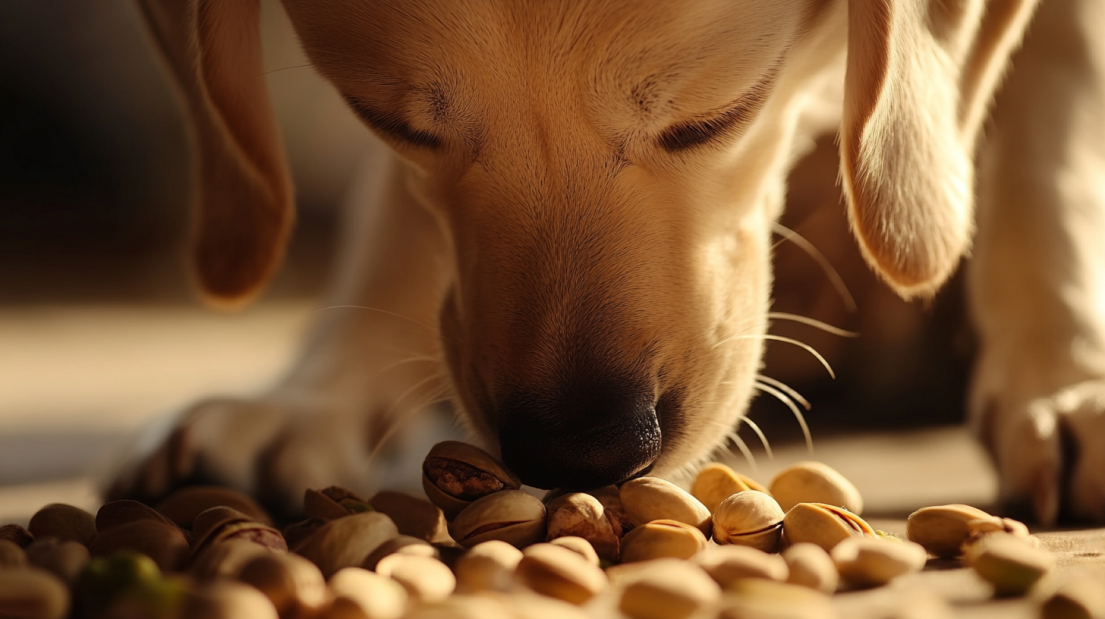
-
 Jane Harmon
Jane Harmon
- Published:
- Updated: March 12, 2024
- Category: Dog Specific Care, Pet Diet and Nutrition
Share Post:
After giving my pet strawberries, I couldn’t stop my curiosity about what should I feed my dog so I decided to explore further. Next in line – blueberries! Through research and consultation with my vet, I discovered the nutritional wonders these berries hold for dogs.
From their abundance of vitamins and fiber to their reputation as antioxidant powerhouses, blueberries seemed like a promising addition to my pup’s menu.
Is this fruit safe for our puppies?

Generally speaking, dogs can safely consume blueberries. They are non-toxic to dogs and can serve as an enjoyable, nutritious treat when given in moderation. However, as with any food, overconsumption can result in digestive distress, leading to symptoms such as diarrhea and vomiting, which we will delve into further down the post.
Also, it’s crucial to consider the size of your dog when feeding them this fruit. Small dogs, or those that tend to gulp their food, might encounter choking hazards if not properly supervised when eating these small, round fruits.
Health Benefits
| Nutrient | Function | Benefits for Dogs |
|---|---|---|
| Dietary Fiber | Aids in digestion and bowel regularity | Promotes healthy digestion |
| Vitamin C | Boosts the immune system and collagen production | Supports a strong immune system |
| Vitamin K | Important for blood clotting and bone health | Contributes to bone and dental health |
| Manganese | Essential for enzyme function and bone health | Supports overall metabolic functions |
| Antioxidants | Protects against free radicals | Helps combat cell damage and aging |
Regarded as one of nature’s superfoods, blueberries are teeming with vitamins, fiber, and antioxidants. But what does this exactly entail, and how does it translate into the health and wellness of your beloved dog? On the nutritional spectrum, they are primarily comprised of dietary fiber, Vitamin C, Vitamin K, and manganese.
These fruits are low-calorie nutrient powerhouses, offering an excellent nutrient-to-calorie ratio, which is highly beneficial for human health. Additionally, blueberries are notorious for their rich antioxidant content.
Antioxidants are crucial substances that aid in shielding the body from the detrimental effects of free radicals, unstable molecules that can cause damage to cells in the body.
Antioxidants and Their Benefits
Blueberries house their antioxidant properties in flavonoids, a type of antioxidant predominantly found in fruits and vegetables. These powerful compounds can provide cellular protection, mitigating the risk of chronic diseases by neutralizing harmful free radicals.
For dogs, the antioxidants found in this fruit could bolster immune health, decelerate the aging process, and even fend off specific diseases. While there is a need for more extensive research to understand the breadth of these benefits fully, the potential for significant health enhancements is promising and noteworthy.
Cognitive Health

Among the prominent benefits of blueberries is their potential to enhance cognitive health. The antioxidants found in this fruit have been linked with slowing cognitive decline and improving memory function in several studies.
This cognitive support could be particularly advantageous for senior dogs, who may be experiencing cognitive aging. Moreover, these antioxidants exhibit anti-inflammatory properties. Chronic inflammation is a contributing factor to many diseases, including those that affect cognitive function.
Thus, by reducing inflammation, blueberries could potentially provide a level of protection for your dog’s brain health.
Cardiovascular Health
Another notable benefit relates to heart health. The antioxidants found in blueberries can alleviate inflammation and oxidative stress, two significant contributors to heart disease. On top of their antioxidant content, blueberries also boast a good amount of dietary fiber.
While dogs don’t need as much dietary fiber as humans, it can nonetheless contribute to their overall health by supporting a healthy digestive system and fostering cardiovascular health.
Potential Risks
While the benefits of this fruit are considerable, they aren’t without potential risks. To make informed decisions about incorporating blueberries into your pet’s diet, it’s crucial to understand these potential drawbacks.
Digestive Problems

As mentioned earlier, blueberries can cause digestive issues if consumed in excess. They should be treated as supplementary treats and not serve as a staple food source for your pet. If your dog ingests too many blueberries, the high fiber content could disrupt its digestive system, potentially leading to diarrhea or vomiting.
If your dog experiences digestive problems after consuming this fruit, it’s important to consult your veterinarian to ensure your dog’s safety and well-being.
Sugar Content
Like all fruits, blueberries contain natural sugars. Though these sugars aren’t as detrimental as the processed sugars found in many human foods, they can still contribute to weight gain and dental issues in dogs if consumed excessively.
As such, it’s crucial to maintain balance in your pet’s diet and ensure they’re receiving a diverse array of nutrients from different sources. While the antioxidants in them offer notable benefits, feeding your pet an overabundance of blueberries could lead to dietary imbalances.
Choking Hazard
Blueberries are small and round, which could pose a choking hazard, especially for small dogs or those who don’t chew their food thoroughly.
Allergic Reactions
While it’s rare, some puppies might exhibit allergic reactions to this fruit. Symptoms of an allergic reaction can include swelling, difficulty breathing, and hives. If your dog shows any of these signs after consuming blueberries, it’s imperative to seek immediate veterinary care.
As a general guideline, whenever introducing new food to your dog’s diet, it’s advisable to do it slowly and in small amounts. This measured approach allows you to closely monitor your pet for any signs of an allergic reaction, ensuring their safety as they experiment with new foods.
Pesticide Residue
If not washed properly, blueberries might have pesticide residue, which could be harmful to dogs. Always wash fruits thoroughly before offering them.
Gastrointestinal Obstruction
Consuming the stems or seeds of blueberries in large quantities might lead to gastrointestinal obstruction, especially in smaller dogs.
Interference with Medications
If your dog is on specific medications, blueberries might interact with the drugs, affecting their efficacy or causing adverse effects.
How to Feed Them to Your Dog?

Assuming you’ve decided to incorporate blueberries into your puppy’s diet, there are a few best practices to follow. These will ensure your pet’s safety while allowing them to enjoy this tasty and nutritious treat.
Moderation is Key
When introducing new food into your pet’s diet, it’s crucial to do so gradually and in moderation. Start by offering your dog a few blueberries and observing their reaction. If they appear to tolerate the fruit well, you can gradually increase the quantity, bearing in mind that blueberries should be treated as a treat and not a staple diet.
Remember, treats (including nutritious fruits like blueberries) should not constitute more than 10% of your dog’s daily caloric intake. An overabundance of anything, no matter how healthy, can be detrimental, and this principle applies to this fruit as well.
Serving Suggestions
Blueberries can be served to your dog in a variety of ways. You can offer them fresh or frozen, or even incorporate them into homemade dog treats. Frozen blueberries can be a refreshing treat on a hot day, and many dogs love the texture of frozen fruit.
However, it’s crucial to avoid feeding your dog processed or blueberry-flavored foods, as these often contain added sugars and other additives that can be harmful to dogs. Always opt for the natural, unprocessed version when feeding blueberries to your dog.
Can my dog eat other fruits?
Yes, there are several alternative fruits that your pet can safely enjoy in moderation. Some of these fruits include:
| Fruit | Nutritional Benefits | Precautions |
|---|---|---|
| Strawberries | High in fiber and vitamin C | Remove stems and feed in moderation |
| Apples | Rich in vitamins and fiber | Remove seeds and core |
| Watermelon | Hydrating and low in calories | Remove seeds and rind |
| Bananas | Good source of potassium and vitamins | Feed in moderation |
| Pineapple | Packed with vitamins and antioxidants | Remove skin and core |
| Raspberries | Antioxidant-rich and high in fiber | Offer in small amounts |
| Cantaloupe | Sweet and hydrating fruit | Remove seeds and rind |
| Mango | High in vitamins and minerals | Remove pit and feed in moderation |
| Pears | Rich in fiber and vitamins | Remove seeds and core |
| Cranberries | Antioxidant properties, urinary tract support | Feed in small quantities |
FAQs:
Can blueberries cause my dog’s poop to turn blue or purple?
Yes, eating a large amount of this fruit can cause a change in the color of your pet’s stool.
Will they freshen my pet’s breath?
While they won’t necessarily freshen breath, blueberries are a healthier alternative to breath mints or gums.
Can all dogs eat them?
Yes, most dogs can eat blueberries, but always check with your veterinarian if you have any concerns or specific health conditions.
How many of them can I give my pet?
Depending on your dog’s size, 1-3 blueberries as an occasional treat is sufficient.
Can I give my overweight puppy these as a snack?
Blueberries are relatively low in calories and can be a healthier treat option for overweight dogs, but always control portions.
The bottom line
In conclusion, blueberries can be an excellent addition to your dog’s diet, providing both nutritional benefits. The key is to offer them in moderation, while closely monitoring your dog for any potential allergic reactions or digestive issues. As long as you bear these points in mind, you can allow your pet to enjoy this nutrient-rich treat with peace of mind!
Related Posts:
- Can Hamsters Eat Blueberries? The Fruity Dilemma
- Can Hamsters Eat Watermelon? A Sweet Combination or…
- Can Hamsters Eat Mangoes? - Sweet Treat for Your Pet
- Can Hamsters Eat Chocolate? Unveiling the Truth…
- 5 Easy Ways to Treat a Sebaceous Cyst on a Dog (2023)
- 10 Unique "Treat" Ideas for Dog with Pancreatitis -…











